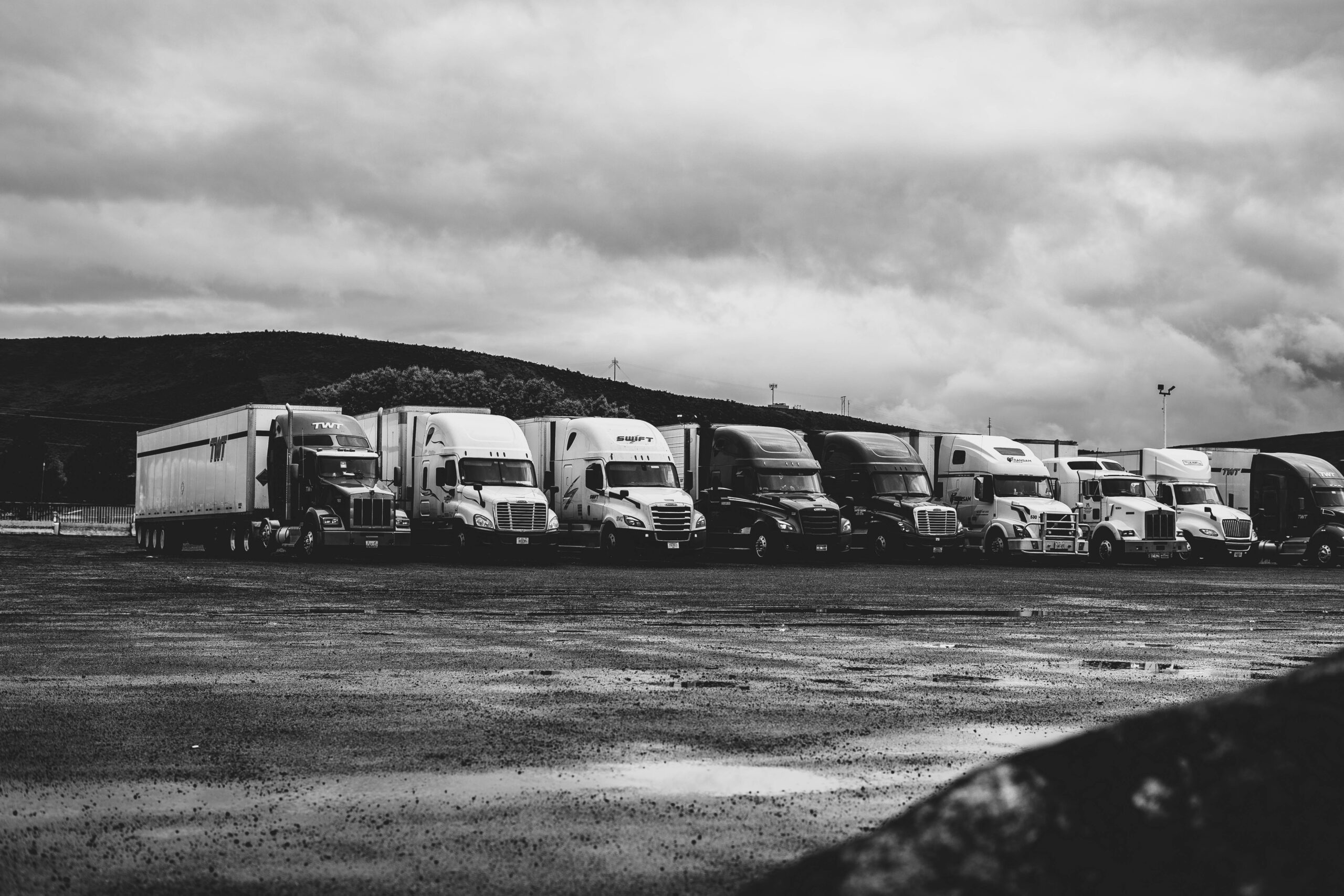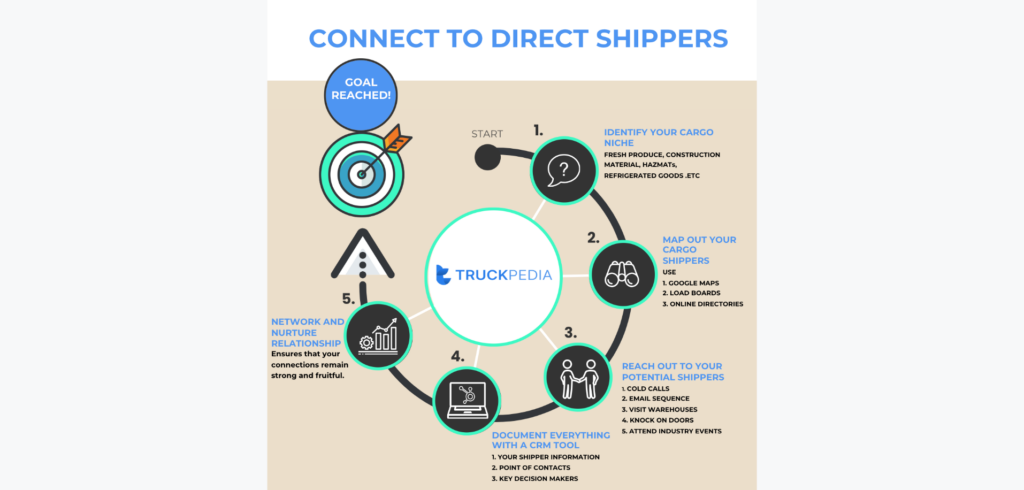Intro
Are you thinking of starting a trucking company? Are you wondering how to grow your trucking business? This guide will show you how to build a successful trucking company with secret tips from decades of working in the industry.
10 tips to get started:
Starting a trucking company can be a daunting task, but with the right planning and execution, it can become a very successful business. Here are 10 tips to help you get started in the trucking industry:
1. Research the industry – it’s important to understand the industry in-depth and what it takes to be successful. There are many resources online and in libraries that can help you learn about the trucking industry. Understand the global supply chain and how each partner plays its part. Dedicate special attention to finding a specific business opportunity in your area that larger companies haven’t served yet. Try to find the gaps in the market where demand is still high and supply is short.
2. Develop a business plan – this is essential for any business, especially for a trucking company. Your business plan will help you determine your start-up costs, operating expenses, marketing strategy, and more. Use expenses calculators to model grossly how your numbers are going to look and which type of financing you’re going to need to buy trucks for your company. Consider talking to CloudTrucks which provides financing for trucking companies.
3. Choose the right truck – it’s crucial to choose the right truck for your business. You’ll need to consider the size and type of truck, as well as the features that are important to you. Research the maintenance costs in advance so you can estimate gross margins in your shipping rates. Read below which types of trucks are the most common for logistic companies.
4. Get the necessary permits and licenses – you’ll need to get a variety of keys and licenses before you can start operating your trucking company. Each state has different requirements, so be sure to check with your local DMV or DOT office. And you will need to apply for a USDOT number provided by the FMCSA.
5. Find a good location – it’s important to choose a good location for your trucking company. You’ll want to consider factors such as proximity to highways, access to truck stops and rest areas, and more. Most logistic companies will be based in clusters filled with many trucking and storage companies. For example near the LA area, there’s Inland Empire, a huge area known for being a huge logistic cluster.
6. Hire good employees – one of the keys to success in any business is hiring good employees. When you’re hiring for your trucking company, be sure to look for people who are reliable, hardworking, and have a good driving record. Hire people that can bring more drivers from their network of friends or ex-colleagues.
7. Train your employees – it’s important to train your employees on the procedures and policies of your trucking company. This will help them do their jobs more effectively and avoid accidents. Create a culture of following the law and always complying with local and federal permits.
8. Develop a marketing strategy – it’s important to let people know about your trucking company. There are many marketing strategies you can use, such as advertising in trucking magazines or online, exhibiting at trucking trade shows, and more. Consider joining a Load Board or a broker platform to find loads and get going.
9. Keep your trucks in good condition – it’s important to keep your trucks in good condition, both for safety and customer satisfaction. Be sure to perform regular maintenance on your trucks and keep them clean and presentable. Use a TMS system to keep all the records neatly organized, so you prepare for the audits and prevent getting fined by transport authorities.
10. Stay up to date on industry news and regulations – it’s important to stay up to date on the latest news and developments in the trucking industry. This will help you make informed decisions about your trucking company and avoid any legal problems. Find trucking news media on Facebook or YouTube so you can stay ahead of big changes that may impact your business. We recommend following Freightwaves for news & updates on their social media accounts.
Which are the most common types of trucks for logistic companies?
1. Box truck
A box truck is a type of truck that is typically used for transporting goods that need to be protected from the elements. Box trucks typically have a large, enclosed cargo area that can be accessed via a rear door or doors. Box trucks are available in a variety of sizes, from small 10-foot trucks to large 26-foot trucks.
2. Flatbed truck
A flatbed truck is a type of truck that has an open, flat cargo area. Flatbed trucks are typically used for transporting goods that do not need to be protected from the elements, such as lumber or construction materials. Flatbed trucks are available in a variety of sizes, from small 10-foot trucks to large 26-foot trucks.
3. Dump truck
A dump truck is a type of truck that is equipped with a hydraulic lifting system that can be used to raise and lower the bed of the truck. Dump trucks are typically used for transporting loose materials, such as dirt, sand, or gravel. Dump trucks are available in a variety of sizes, from small 10-ton trucks to large 40-ton trucks.
4. Tanker truck
A tanker truck is a type of truck that is designed for transporting liquids or gasses. Tanker trucks are available in a variety of sizes, from small 5,000-gallon tanks to large 30,000-gallon tanks. Tanker trucks are typically used for transporting fuel or other hazardous materials.
5. Reefer truck
A reefer truck is a type of truck that is equipped with a refrigeration unit that can be used to keep cargo cool or frozen. Reefer trucks are typically used for transporting perishable goods, such as food or pharmaceuticals. Reefer trucks are available in a variety of sizes, from small 10-foot trucks to large 26-foot trucks.
6. Car carrier
A car carrier is a type of truck that is designed for transporting vehicles. Car carriers typically have multiple levels on which vehicles can be loaded and unloaded. Car carriers are available in a variety of sizes, from small 2-car carriers to large 10-car carriers
How to Become a Trucking Dispatcher in the US?
If you’re interested in becoming a trucking dispatcher, there are a few things you need to know. The trucking dispatcher is the person who coordinates the movement of trucks and drivers, ensuring that cargo is delivered on time. They work with truck drivers, customers, and other trucking companies to make sure that everything runs smoothly.
If you simply want to become a truck dispatcher for another company, then the process is much the same as it would be for finding any job. You can look on job boards to see if any open truck dispatcher positions interest you, or you can approach individual carriers and express your interest in becoming a freight dispatcher. You can ask if they’d be willing to train you or if they can offer you some kind of entry-level position.
However, things get even more interesting for those who view becoming a truck dispatcher as a business opportunity. If you want to become an independent truck dispatcher, the first thing you need is education. People often think they can jump right into starting their own business, but the truth is that you need to start with training that focuses on the basic information around truck dispatching and how to promote your company.
Requirements will vary, but many employers will at least want a high school diploma or GED and some customer service experience. Many people are perfectly happy working as an employee of a single company rather than as independent truck dispatchers. Once you have a grasp of truck dispatching and of how you want to operate your business, you can follow these steps to become an independent truck dispatcher:
Step One: Register Your Business
Starting as a truck dispatcher begins with choosing your name and officially registering your business. When naming your business, the key is to be short and to the point. I recommend that you include terms like “independent dispatch” or “dispatching services” in your name so that it will be easier for people to find you. Having a clear name also means potential customers will know exactly what your business does when they come across it. Too many dispatchers use names like “trucking” or “logistics,” which don’t give any information on what their business does.
Once you have a name for your business, you need to apply for your Employer Identification Number (EIN) with the IRS and determine your business structure. Options include a sole proprietorship, limited liability company (LLC), corporation, or partnership. I typically recommend applying for an LLC or Inc. structure.
You should also create drafts of some of the contracts that will be essential to your business function. That includes the service agreement, where you state what you are charging and what services you will provide for that fee, and the dispatcher-carrier agreement, which ensures the carrier’s insurance will protect you from liability if something outside of your control goes wrong with the freight you negotiated. Having drafts of these documents ready means you’ll be able to start working for your partners faster.
Step Two: Establish an Online Presence
Establishing an effective online presence and marketing strategy means building a website and creating accounts across various social channels. Try to pick a website name that includes your business name but is short and easy to remember. You can check to see if your desired domain name is available from sites like Google Domains and you can build the website easily for free on Google Sites. Most importantly, your website will create trust with any potential partners who would do business with you.
Once you’ve registered your domain name, you can create a Facebook page with the same name for Facebook and Instagram ads (Meta Business Manager). If it’s up your alley, you should also consider making a YouTube channel. With a YouTube channel, you can demonstrate your knowledge and build your authority with subscribers.
Step Three: Get a Load Board Subscription
Working as a truck dispatcher means finding quality, relevant loads for your carriers. To do that, you’re going to need a subscription to a high-quality load board where you’ll be able to access thousands of freight listings from across the country. While there are some free load boards available, you need to invest in a paid subscription board if you want to find quality freight for your carriers.
If you’re serious about your independent dispatcher business, you can’t go without a load board. Many platforms offer load boards for truck dispatchers, with hundreds of thousands of new loads posted each business day. Here are some load boards with ratings on FreightWaves.
Step Four: Start Making Connections
While load boards are a great way to find loads for carriers, real success in the trucking industry is all about making connections. You not only want to start finding carriers as soon as possible, but you also want to make connections with shippers and brokers. A good place to start is with an online directory, that makes it easy to find any partners you could want.
Facebook groups for carriers in the transportation industry can be a good place to promote your business for free. You can join and get your name out there by commenting or creating posts offering your independent truck dispatcher services.
Once you have carriers, it’s time to start finding loads. If you have a subscription to the load board of your choice, you can start using it to find loads right away. You can either post the trucks you have and let the system find a match, or you can perform a search. Just put in all the information about the truck you’re trying to fill including the type, any special features it may have, and the lanes, origin, and destination you are looking for.
With a load board, you can save your searches so you don’t have to reenter the information each time you search for loads for the same truck. You can even set alerts on your searches so that if there isn’t a perfectly matching load right now, you will be notified as soon as one is posted — which shouldn’t take that long with hundreds of thousands of new loads being posted daily.
Once you find a load that matches the carrier or owner-operator’s needs, you can begin negotiations with the broker. Freight brokers take a commission for each transaction, but will ensure your business starts moving as fast as possible. You should consider using TMS software that will automate most of your manual work as a newly created company and will ensure the best customer service right from the start.
How to best prepare for a DOT and state audits?:
When you start a trucking company, you’ll need to be aware of DOT audits. A DOT audit is a review of your trucking company by the Department of Transportation. They will examine your company’s safety procedures and policies, as well as your drivers’ records and trucking operations. They will surely request that you provide all the maintenance records for each truck you registered, so we recommend using Ezpapel TMS to keep all docs neatly organized and ready for the next audit.
If your trucking company fails a DOT audit, you could face fines or even have your company shut down. That’s why it’s important to make sure your company complies with all DOT regulations. You can do this by implementing strong safety procedures and training your employees on how to follow them.
You should also keep track of any changes in DOT regulations and update your policies and procedures as necessary.
The California Highway Patrol (CHP) is responsible for enforcing commercial vehicle laws in California. If your trucking company operates in California, you’ll need to be familiar with the CHP’s commercial vehicle audit process.
The CHP conducts regular audits of commercial vehicles to ensure that they comply with state laws and regulations. During an audit, the CHP will inspect your truck and trailer, as well as your driver’s logbook and other documentation. They may also conduct a driver safety inspection and a mechanical inspection.
If the CHP finds that your trucking company is not in compliance with state laws, they may issue a citation or take other enforcement actions. It’s important to make sure that your trucking company is in compliance with all applicable laws and regulations, and that you have the proper documentation to pass a commercial vehicle audit.
Conclusions:
By following these steps, you can start a trucking company that will be successful. Trucking is a great way to earn a good living, and with the right planning and execution, you can be successful in this industry. Book a demo now to discover how Ezpapel TMS will help your trucking business get started the right way and pave your path to success. Good luck!


